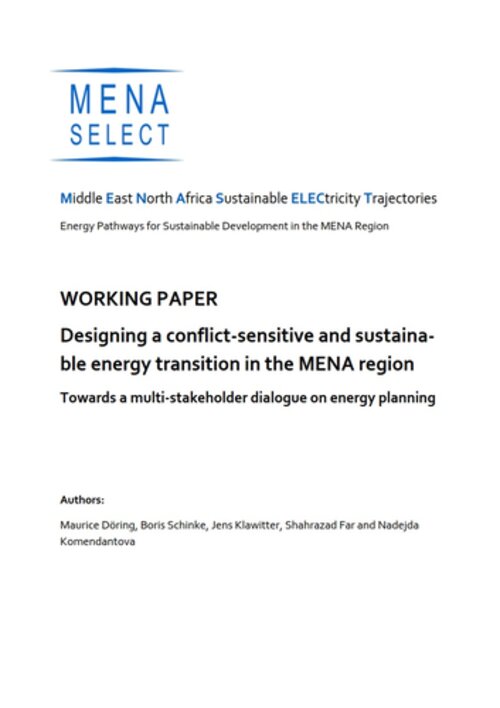Publications
Designing a conflict-sensitive and sustainable energy transition in the MENA region: Towards a multi-stakeholder dialogue on energy planning (MENA SELECT Working Paper).
Release Date
2018-12
Language
- English
Topics
- –
Energy transitions are more than just a process of replacing one type of electricity generation technology with another and eventually amending some market frameworks to support this switch economically. Energy transitions run deep in- to the fabric of social relations and require a fundamental change to how societies are built. They are complex problems of social change that unfolds on all levels of society. Societies, which seek to embark on a committed pathway to energy transitions to sustainability must learn that the complexity and contingency of energy transitions cannot be controlled by some groups of actors alone in a hierarchical power system. It is an undertaking of fundamental social change which concerns and affects everyone and is consequently subjected to diverse interests, objectives, attitudes, expectations, aspirations, and preferences. Managing energy transitions means, on the one hand, acknowledging the human inability to predict the future of decisions or control the outcomes. On the other, it means managing the conflicts of interests among different social interest groups constructively to avoid opposition to policies but instead, generate societal support. For societies to achieve their envisioned goals in energy transitions, all policies and initiatives must be harmonised to aim in the same direction of change. To do so, societies must become aware of how energy transitions will change them.
In this Working Paper, the authors first present a theoretical framework to deepen this understanding and then a conceptual approach of how to govern energy transitions in a horizontal and inclusive multi-stakeholder dialogue. The authors argue that energy transitions inevitably challenge existing power relations and practices and that energy transitions can only be sustainable and successful, if the underlying policies can balance the interests of contesting social stakeholder groups and if the generated benefits to these groups exceed the adverse impacts they will have to bear from the policies. Only then, energy policies to implement the energy transition are likely to receive societal support, which is needed to move forward and to prevent economically, socially and politically costly public opposition to energy policies. In the Paper, the authors show how a “niche of opportunity” for innovative, horizontal governance approaches was designed and tested within the framework of the “Middle East and North Africa – Sustainable ELECtricity Trajectories” (MENA SELECT) project in Morocco, Jordan and Tunisia.
PDF-Download
MS_WP_Designing_a_conflict-sensitive_and_sustainable_energy_transition_in_the_MENA_region.pdf
[English] (7.73 MB)

Cite as
@misc{DoringSchinkeKlawitter2018,
author = "Maurice Döring and Boris Schinke and Jens Klawitter and Shahrazad Far and Nadejda Komendantova",
title = "Designing a conflict-sensitive and sustainable energy transition in the MENA region: Towards a multi-stakeholder dialogue on energy planning (MENA SELECT Working Paper).",
latexTitle = "Designing a conflict-sensitive and sustainable energy transition in the MENA region: Towards a multi-stakeholder dialogue on energy planning (MENA SELECT Working Paper).",
publisher = "BICC",
institution = "BICC",
type = "Other publications",
year = "2018",
address = "Bonn",
}
Document-Type
Other publications
Publisher
BICC
Place
Bonn
Countries/Region
Morocco , Jordan , Tunisia



